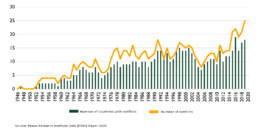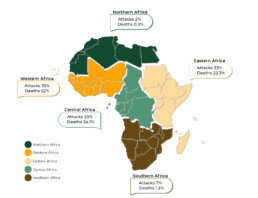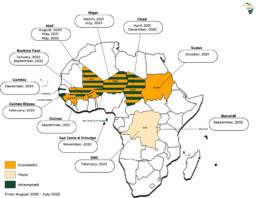Briefing on Continental Early Warning and Security Outlook
Date | 21 August 2023
Tomorrow (22 August), the African Union (AU) Peace and Security Council (PSC) is expected to convene its 1169th session to receive briefing on continental early warning and security outlook. This briefing is expected to be delivered by the Committee of Intelligence and Security Services of Africa (CISSA); African Centre for the Study and Research on Terrorism (ACSRT); and African Union Mechanism for Police Cooperation (AFRIPOL).
Following opening remarks by Willy Nyamitwe, Permanent Representative of Burundi and Chairperson of the PSC for the month of August, AU Commissioner for Political Affairs, Peace and Security (PAPS), Bankole Adeoye is expected to make a statement. Executive Secretary of CISSA, Zainab Ali Kotoko is also expected to make a statement. Representatives of ACSRT and AFROPOL are also expected to deliver briefings.
Taking place in line with the decision of PSC’s 1073rd session which requested for quarterly briefings on continental early warning and security outlook, tomorrow’s session is expected to discuss the state of the political and security situation of the continent since the last briefing on the security outlook of the continent. At the 1138th session when the PSC last received a briefing on early warning and security outlook of the continent, the increasing spread of terrorism, resurgence of unconstitutional changes of government (UCG) and unstable political transitions were among the main concerns that received attention. During tomorrow’s session, members of the PSC may seek update on the measures taken to follow up on the outcome of the previous session and what more needs to be done in respect to these conditions.
The changing nature of conflicts in Africa is perhaps one of the first concerns that may feature in tomorrow’s briefing. This can be viewed from at least two perspectives. The first one involves the increasing trend in urban based hostilities in parts of Africa. Although not a new phenomenon, the increase in the prevalence of conflicts in urban areas necessitates re-examination of the response of AU to conflicts. As the unfolding civil war in Sudan attests, conflicts in urban areas exponentially increase civilian casualties and the destruction of civilian infrastructure including strategic facilities.
These features of conflicts in urban settings underscore the need for making observance of international humanitarian law (IHL) principles the central focus of regional and continental peace and security diplomacy. Securing commitment of and pressing conflict parties to observe IHL rules should be made part of the ToRs of mediators and envoys. Significantly, the PSC needs to add to the tools that are used for enhancing civilian protection in such conflict settings the establishment of a dedicated mechanism for monitoring, investigating and reporting on violations.
Another important manifestation of the changing nature of conflicts in the continent is related to the spike in internationalisation of internal armed conflicts in African countries. While the involvement of external actors in conflict situations in Africa is not a new development, data sources indicate a significant rise in such interventions observed over the past few years. A recent research documents for example that while only 12 internationalised conflicts were recorded in Africa between 1991 and 2010, 27 such conflicts were recorded in the years from 2011 to 2021. And in 2021 alone, 17 cases of internationalised conflicts were documented. This is further compounded by the rise of ‘emerging powers’ and their aspiration to exert influence on the direction and outcome of conflicts as happened in the conflicts in Libya and most recently in the Horn of Africa. As being experienced in Libya and Sudan, one of the major consequences of this increasing internationalization of conflicts in Africa is the increasing decline in the leadership role of the AU in mobilizing conflict management and resolution efforts.
Another related feature of the peace and security landscape of the continent that the PSC needs to reflect on during tomorrow’s session is the deepening geopolitical rivalry pitting western countries such as the US and France against Russia and China is exacerbating existing conditions of fragility and insecurity on the continent. This is playing itself out in conflicts in the Sahel, Horn of Africa and Great Lakes Region, among others, as well as the resurgence of coups and the contestations surrounding how to respond to the coups as is currently unfolding in Niger.
A concerning persistent trend on which ACSRT would provide update in tomorrow’s briefing is the growing threat of terrorism and violent extremism. Apart from the eruption of new conflicts (a case in point being Sudan’s new conflict that erupted in April 2021), conflicts involving terrorist groups are main feature of the rise in the number and geographic spread of conflicts in Africa, as depicted in the graph below.

According to the ACSRT’s quarterly bulletin on terrorism in Africa, in the first quarter of 2023 alone, 426 terrorist attacks were recorded resulting in 2,809 deaths. Of the total deaths recorded, majority (1,226) were civilians demonstrating the continuing increase in civilian casualties resulting from terrorist attacks. On the other hand, despite the civilian harm most attacks continued to result in, the primary targets of majority of the attacks perpetrated during the first quarter of 2023 were military and security forces.
ACSRT’s bulletin further indicates the increase experienced both in terrorist attacks and deaths ensuing therefrom, in the first quarter of 2023 as compared to the pervious reporting period (last quarter of 2022). While attacks have shown a 43% increase, related deaths have increased by 60%. In terms of regions most affected by terrorist attacks, west Africa continues to contribute the highest number of attacks as well as related casualties, with east and central Africa following closely.

Aside from the spike in terrorist attacks, it is also important to note the increasing sophistication and complex nature of terrorist activities. In the Lake Chad Basin (LCB) region, terrorist groups such as the Islamic State’s West Africa Province (ISWAP) have been noted not only for scaling up their use of Improvised Explosive Devices (IEDs) but also deploying efforts for the usage of drones to carry out attacks. It is known that previously, terrorist networks like Boko Haram have been able to use unmanned aerial vehicles (UAVs) for the purposes of surveillance.
While the AU entities that deliver the briefing on the security outlook are by the very nature of their mandate focus on hard security dimension of the peace and security dynamics of the continent, the challenge that the democratic governance deficit poses to peace and security in Africa also deserves not any less importance, including from prevention dimension. In this respect, it would be of particular significance for the PSC’s reflection to go beyond a focus on the resurgence of coups as the coup in Niger makes clear.

Tomorrow’s session needs to critically interrogate the deleterious impact that elections with questionable legitimacy, prolongation of power by tampering with constitutional provisions on presidential term limits, corruption and nepotism and the failure of states to deliver basic services have on political stability on the continent. In this context and in the light of the risk for coups arising from elections whose legitimacy is contested, there is a need for reflecting on the lessons from the recent Sierra Leone elections and the need for monitoring the post-electoral environment with a view to help address the situation. Although there is necessity for a margin of appreciation that enables member states to deal with certain governance and peace and security issues internally, the AU and relevant RECs have the duty to effectively implement their preventive mandates by deploying the appropriate measures to address these conditions before they erupt into more serious threats.
Impacts of climate change on peace and security forms another factor that may feature in tomorrow’s briefing. In addition to fuelling intercommunal violence, such as the conflict between herder and farming communities in parts of West Africa and the Sahel, by intensifying competition over increasingly depleting scarce resources, climate induced whether conditions ranging from droughts to flooding in the Horn of Africa continue to have a devastating effect on significant portion of populations across Africa. Faced with food insecurity, environmental degradation and loss of livestock as well as arable land, thousands of peoples in various African countries are regularly displaced from their homes. In addition to straining the continent’s humanitarian response capacity, these climatic conditions severely challenge capacities of states and multilateral bodies for managing existing conditions of insecurity and conflict.
The expected outcome of tomorrow’s session is a Communiqué. The PSC is expected to take note of the emerging as well as persisting peace and security threats in Africa. It may express the need for the AU to mobilize deliberate and targeted strategies on the various threats to peace and security on the continent ranging from those focusing on mitigation to those involving sustained use of conflict resolution tools working together with member states and the relevant RECs/RMs to effectively and timely respond to these concerns. The PSC may request that RECs/RMs and the governance and human rights bodies of the AU including the African Peer Review Mechanism (with its additional mandate of early warning) to work with the AU entities that deliver the quarterly briefing on continental early warning and security outlook both in the delivery of the briefing and in developing targeted strategies and plans for mitigating and resolving these security threats including through the use of the various APSA and AGA tools. The PSC may underscore the need for member states to avoid denialism and the invoking of national sovereignty in order to enable a more enhanced collaboration with relevant AU and RECs/RMs mechanisms for conflict prevention. The PSC may also request that the quarterly briefings apart from providing comprehensive update on the overall outlook provide focused analysis on specific peace and security threats in the briefings to enable a more focused engagement on such specific aspect of the peace and security outlook. In this respect, the PSC may request that the AU Commission provide it with analysis on the impact of the increasing influence of middle powers and geopolitical rivalry in Africa and the attendant adverse impacts on peace and security. Having regard to the continued prevalence of security threats related to UCG and terrorism, the PSC may also call for review of the Declaration on Terrorism and UCG in Africa adopted at the 16th Extraordinary Session of the AU Assembly [Ext/Assembly/AU/Decl.(XVI)] and the development of effective responses within the framework of the declaration to arrest the spread of UCGs and terrorism in Africa.